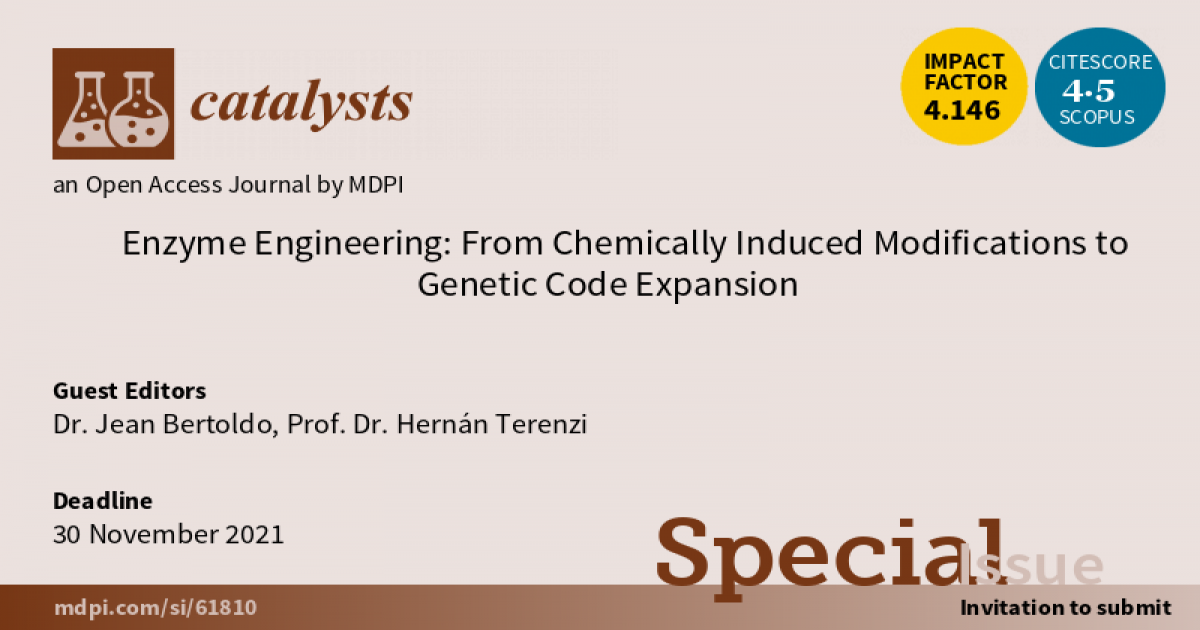Enzyme Engineering: From Chemically Induced Modifications to Genetic Code Expansion
A special issue of Catalysts (ISSN 2073-4344). This special issue belongs to the section "Biocatalysis".
Deadline for manuscript submissions: closed (30 November 2021) | Viewed by 7051

Special Issue Editors
Interests: protein engineering; chemical biology; proteomics and drug discovery
Special Issue Information
Dear Colleagues,
Enzyme engineering has become extremely important for biocatalytic processes, which is observed by the amount of research that has been dedicated to this field in the past decade. This interest is due to the intrinsic features of enzymes and their advantages over chemical catalysts such as high productivity, specificity, and catalytic efficiency, but it is also faced with high cost and low stability issues. These drawbacks have propelled the development of several methods to tackle these problems while also avoiding the cost and waste associated with single-use and throwaway practices. Traditional methods of enzyme engineering have enabled the production of stable and highly efficient enzymes as well as entirely new functionalities, but they have also started to concede space to more advanced approaches. Recent efforts have focused on induced chemical modifications and genetic code expansion to install new catalytic modalities, expand acceptable substrates, and increase thermostability amongst other features. This Special Issue aims to cover the progress and trends in traditional enzyme engineering, new chemical methods to modify and modulate enzyme activity and structure, genetic code expansion by insertion of noncannocial amino acids (ncAA), and other strategies to develop innovative biocatalysts.
Dr. Jean Bertoldo
Prof. Dr. Hernán Terenzi
Guest Editors
Manuscript Submission Information
Manuscripts should be submitted online at www.mdpi.com by registering and logging in to this website. Once you are registered, click here to go to the submission form. Manuscripts can be submitted until the deadline. All submissions that pass pre-check are peer-reviewed. Accepted papers will be published continuously in the journal (as soon as accepted) and will be listed together on the special issue website. Research articles, review articles as well as short communications are invited. For planned papers, a title and short abstract (about 250 words) can be sent to the Editorial Office for assessment.
Submitted manuscripts should not have been published previously, nor be under consideration for publication elsewhere (except conference proceedings papers). All manuscripts are thoroughly refereed through a single-blind peer-review process. A guide for authors and other relevant information for submission of manuscripts is available on the Instructions for Authors page. Catalysts is an international peer-reviewed open access monthly journal published by MDPI.
Please visit the Instructions for Authors page before submitting a manuscript. The Article Processing Charge (APC) for publication in this open access journal is 2200 CHF (Swiss Francs). Submitted papers should be well formatted and use good English. Authors may use MDPI's English editing service prior to publication or during author revisions.
Keywords
- Noncanonical amino acids (ncAAs)
- Genetic code expansion
- Directed evolution
- Site-directed mutagenesis
- Posttranslational chemical mutagenesis
- New enzyme modalities
- Site-specific protein modification
- Unnatural amino acids (UAAs)
- Protein functionalization
- Reusable biocatalysts
Benefits of Publishing in a Special Issue
- Ease of navigation: Grouping papers by topic helps scholars navigate broad scope journals more efficiently.
- Greater discoverability: Special Issues support the reach and impact of scientific research. Articles in Special Issues are more discoverable and cited more frequently.
- Expansion of research network: Special Issues facilitate connections among authors, fostering scientific collaborations.
- External promotion: Articles in Special Issues are often promoted through the journal's social media, increasing their visibility.
- Reprint: MDPI Books provides the opportunity to republish successful Special Issues in book format, both online and in print.
Further information on MDPI's Special Issue policies can be found here.






